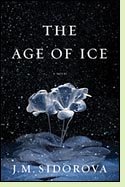The Age of Ice
by J.M. Sidorova
Reviewed by Margaret Donsbach

In The Age of Ice, a child is conceived in 1740 in his parents' wedding chamber of ice, a cruel whim of the Russian Empress. "I was born," says the fictional Alexander Velitzyn, "of cold copulation, white-fleshed and waxy like a crust of fat on beef broth left outside in winter." As a young man, he becomes aware of his uniquely awkward physical condition: emotions - including sexual passion - turn his body ice-cold. Over the course of his long life, he discovers more about this syndrome, surviving not only the tragically misguided 1785-1794 Slava Rossy expedition's search for a sea passage between the Atlantic and Pacific oceans, but also Napoleon's 1812 Russian invasion and frigid retreat, and the nineteenth-century Russian-British rivalry over Afghanistan, into the twenty-first century, to wonder whether he may be the one person who can reverse global warming.
Factual details, like axes shattering on tree trunks in the Siberian winter, are as vivid as the fantastic. A menacing ice formation is "a knotted and tangled profusion of different ice forms: cascades of water frozen in motion, foaming eruptions of rime, long veins like icicles ..." Ice and cold are as actively present as the human characters. The Arctic expedition and its aftermath make the most gripping story, so gripping that later episodes feel anticlimactic.
The central metaphor in The Age of Ice is complex enough to leave readers considering its deeper meaning. To equate Alexander's odd condition with emotional coldness would be far too simplistic: he does feel emotion; it's the people around him who are chilled when he touches them in the throes of joy or anguish. But the novel is not primarily about individual personal relationships; it explores the suffering caused by powerful men and women who, pursuing whims of scientific curiosity, conquest, or petty pique, destroy the lives of those caught in the undertow of their careless scheming. (2013, 398 pages, including an Acknowledgments section mentioning source material)
More about The Age of Ice at Powell's Books or Amazon.comOther novels about Arctic and Antarctic expeditions:
The Terror by Dan Simmons (2006), a Gothic thriller about Sir John Franklin’s 1845 Arctic expedition. More info
Death on the Ice by Robert Ryan (2009), a realistic novel about Robert Falcon Scott's doomed expedition to the South Pole. See review or
more info at Powell's Books
Dark Matter by Michelle Paver (2010), a horror novel about a man on a 1937 Arctic expedition who encounters a mysterious presence. More info
Nonfiction about the Slava Rossy expedition:
An Account of a Geographical and Astronomical Expedition to the Northern Parts of Russia by Martin Sauer (1802). More info
Siberia and Northwestern America, 1788-1792: The Journal of Carl Heinrich Merck by Carl Heinrich Merck (manuscript discovered in 1935). More info
The Man Who Ate His Boots: The Tragic History of the Search for the Northwest Passage by Anthony Brandt (2010), omits mention of the eighteenth-century Slava Rossy expedition, but includes the nineteenth-century Franklin expedition and others. More info
Online:
Joseph Billings, about the leader of the Slava Rossy expedition and his search for the Northwest Passage.
Back to Novels of the 18th Century
Back to Directory of Book Reviews